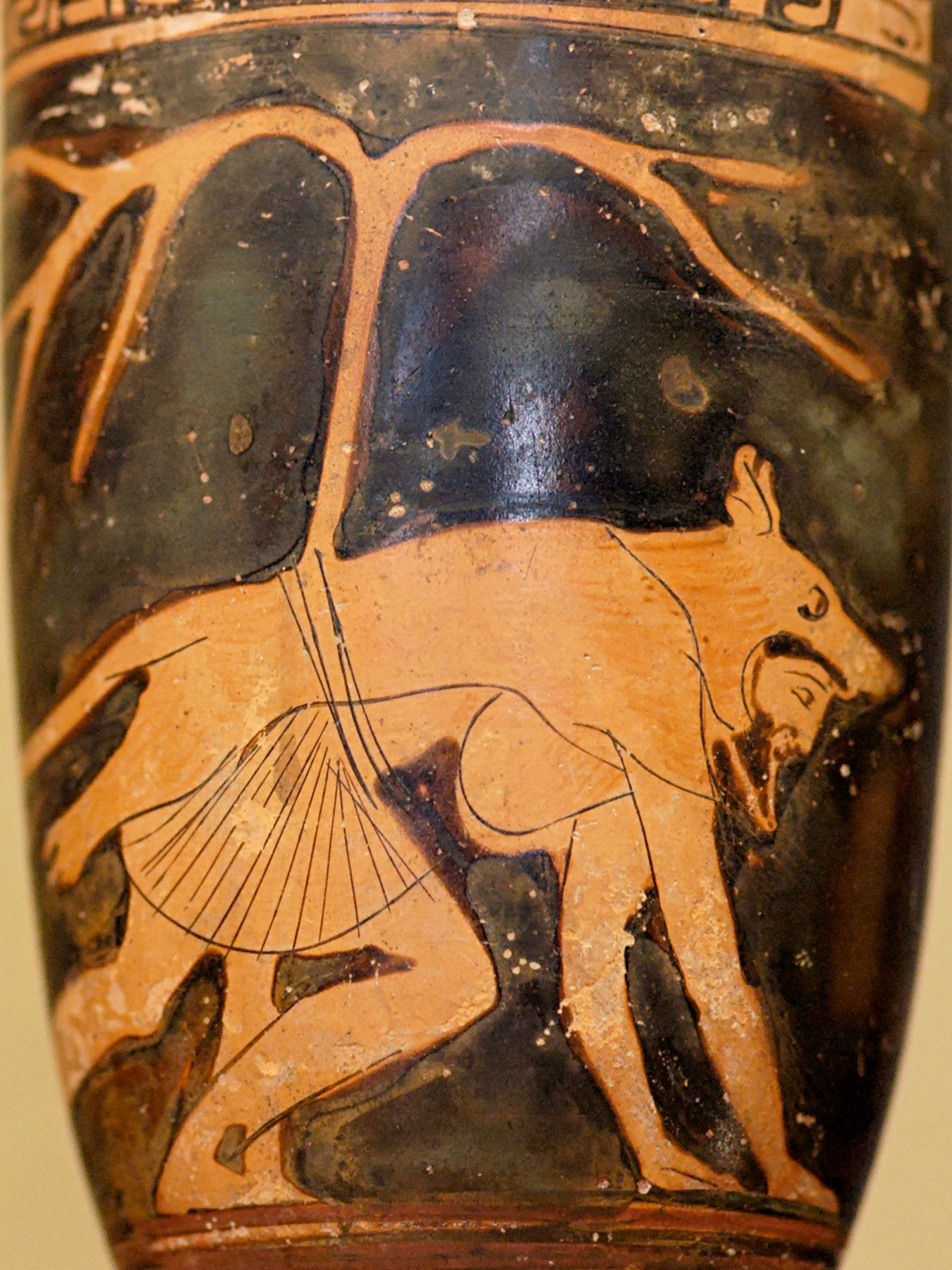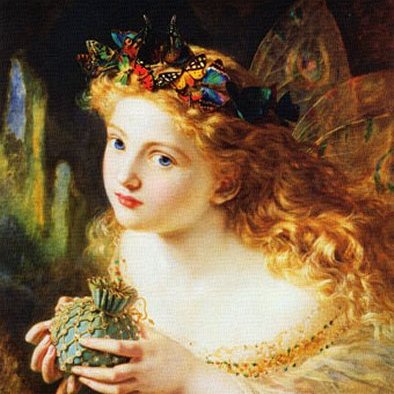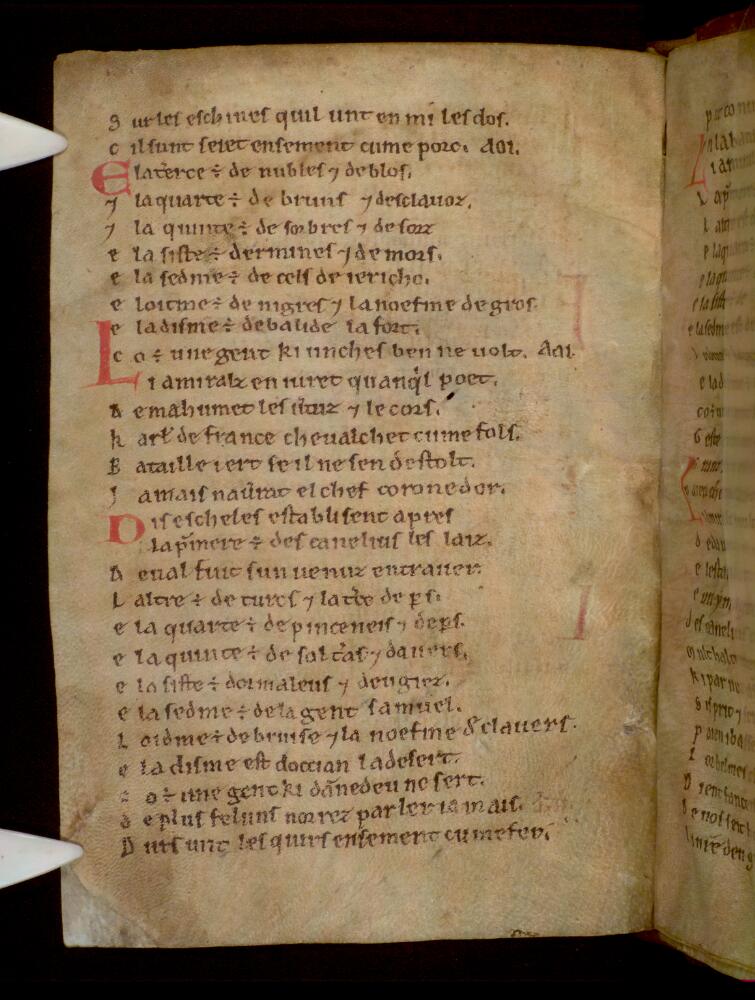|
Melion
''Melion'' is an anonymous Breton lai that tells the story of a knight who transforms into a werewolf for the love of his wife who betrays him. Composition and manuscripts The actual date of composition is estimated between 1190 and 1204. The lai of ''Melion'' is contained in one existing manuscript: C. Paris, Bibliothèque de l'Arsenal, 3516, f. 343r, col. 1 - 344r, col. 4. This manuscript dates from 1268. The text is written in the Picard dialect. Plot summary ''Melion'' tells the story of a knight named Melion who serves King Arthur and who vows that he will never marry a woman who has loved another man. In the age of courtly love, it is impossible for Melion to find such a woman at court. One day while out hunting, Melion meets the daughter of the King of Ireland who tells him that she has never loved a man other than him. They marry and have two children. Three years later, Melion, his wife, and a squire go hunting. Melion sees a beautiful stag, and his wife declar ... [...More Info...] [...Related Items...] OR: [Wikipedia] [Google] [Baidu] |
Bisclavret
"Bisclavret" ("The Werewolf") is one of the twelve Lais of Marie de France written in the 12th century. Originally written in French, it tells the story of a werewolf who is trapped in lupine form by the treachery of his wife. The tale shares a common ancestry with the comparable '' Lay of Melion'', and is probably referenced in Sir Thomas Malory's '' Le Morte d'Arthur'' with the tale of Sir Marrok, who has a similar story. Background Marie de France claimed that she translated this lay, as well as the other eleven she wrote, from the Breton language, in which she claimed to have heard them performed. There have been many translations of her work into the English language, the translation noted below was done by Eugene Mason. Synopsis Bisclavret, a baron in Brittany who is well loved by the king, vanishes every week for three full days. No one in his household, not even his wife, knows where he goes. His wife finally begs him to tell her his secret and he explains that he is a we ... [...More Info...] [...Related Items...] OR: [Wikipedia] [Google] [Baidu] |
Werewolf
In folklore, a werewolf (), or occasionally lycanthrope (; ; uk, Вовкулака, Vovkulaka), is an individual that can shapeshift into a wolf (or, especially in modern film, a therianthropic hybrid wolf-like creature), either purposely or after being placed under a curse or affliction (often a bite or the occasional scratch from another werewolf) with the transformations occurring on the night of a full moon. Early sources for belief in this ability or affliction, called lycanthropy (), are Petronius (27–66) and Gervase of Tilbury (1150–1228). The werewolf is a widespread concept in European folklore, existing in many variants, which are related by a common development of a Christian interpretation of underlying European folklore developed during the medieval period. From the early modern period, werewolf beliefs also spread to the New World with colonialism. Belief in werewolves developed in parallel to the belief in witches, in the course of the Late Middle ... [...More Info...] [...Related Items...] OR: [Wikipedia] [Google] [Baidu] |
Werewolf Written Fiction
In folklore, a werewolf (), or occasionally lycanthrope (; ; uk, Вовкулака, Vovkulaka), is an individual that can shapeshift into a wolf (or, especially in modern film, a therianthropic hybrid wolf-like creature), either purposely or after being placed under a curse or affliction (often a bite or the occasional scratch from another werewolf) with the transformations occurring on the night of a full moon. Early sources for belief in this ability or affliction, called lycanthropy (), are Petronius (27–66) and Gervase of Tilbury (1150–1228). The werewolf is a widespread concept in European folklore, existing in many variants, which are related by a common development of a Christian interpretation of underlying European folklore developed during the medieval period. From the early modern period, werewolf beliefs also spread to the New World with colonialism. Belief in werewolves developed in parallel to the belief in witches, in the course of the Late Middle Ages an ... [...More Info...] [...Related Items...] OR: [Wikipedia] [Google] [Baidu] |
Breton Lai
A Breton lai, also known as a narrative lay or simply a lay, is a form of medieval French and English romance literature. Lais are short (typically 600–1000 lines), rhymed tales of love and chivalry, often involving supernatural and fairy-world Celtic motifs. The word "lay" or "lai" is thought to be derived from the Old High German and/or Old Middle German ''leich'', which means play, melody, or song, or as suggested by Jack Zipes in ''The Oxford Companion to Fairy Tales'', the Irish word ''laid'' (song).Zipes, 62 Zipes writes that Arthurian legends may have been brought from Wales, Cornwall and Ireland to Brittany; on the continent the songs were performed in various places by harpists, minstrels, storytellers.Zipes, Jack, ''The Oxford Companion to Fairytales''. Oxford UP. 2009 62-63 Zipes reports the earliest recorded lay is Robert Biker's Lai du Cor, dating to the mid- to late-12th century. The earliest of the Breton lais to survive is probably ''The Lais of Marie de ... [...More Info...] [...Related Items...] OR: [Wikipedia] [Google] [Baidu] |
Arthurian Characters
The Arthurian legend features many characters, including the Knights of the Round Table and members of King Arthur's family King Arthur's family grew throughout the centuries with King Arthur's legend. Many of the legendary members of this mythical king's family became leading characters of mythical tales in their own right. Medieval Welsh tradition In Welsh Arth .... Their names often differ from version to version and from language to language. The following is a list of characters with descriptions. : Indicates a Knight of the Round Table. See also * List of characters named Ywain in Arthurian legend References {{Arthurian Legend Arthurian, Arthurian characters ... [...More Info...] [...Related Items...] OR: [Wikipedia] [Google] [Baidu] |
Old French Texts
Old or OLD may refer to: Places * Old, Baranya, Hungary * Old, Northamptonshire, England *Old Street station, a railway and tube station in London (station code OLD) *OLD, IATA code for Old Town Municipal Airport and Seaplane Base, Old Town, Maine, United States People * Old (surname) Music *OLD (band) OLD (originally an acronym for Old Lady Drivers) was an American heavy metal band from Bergenfield, New Jersey, formed in 1986 and signed to Earache Records. It featured Alan Dubin on vocals, and James Plotkin on guitars and programming, bo ..., a grindcore/industrial metal group * ''Old'' (Danny Brown album), a 2013 album by Danny Brown * ''Old'' (Starflyer 59 album), a 2003 album by Starflyer 59 * "Old" (song), a 1995 song by Machine Head *'' Old LP'', a 2019 album by That Dog Other uses * ''Old'' (film), a 2021 American thriller film *'' Oxford Latin Dictionary'' * Online dating *Over-Locknut Distance (or Dimension), a measurement of a bicycle wheel and frame * ... [...More Info...] [...Related Items...] OR: [Wikipedia] [Google] [Baidu] |
Arthurian Literature In French
King Arthur ( cy, Brenin Arthur, kw, Arthur Gernow, br, Roue Arzhur) is a legendary king of Britain, and a central figure in the medieval literary tradition known as the Matter of Britain. In the earliest traditions, Arthur appears as a leader of the post-Roman Britons in battles against Saxon invaders of Britain in the late 5th and early 6th centuries. He appears in two early medieval historical sources, the ''Annales Cambriae'' and the ''Historia Brittonum'', but these date to 300 years after he is supposed to have lived, and most historians who study the period do not consider him a historical figure.Tom Shippey, "So Much Smoke", ''review'' of , ''London Review of Books'', 40:24:23 (20 December 2018) His name also occurs in early Welsh poetic sources such as ''Y Gododdin''. The character developed through Welsh mythology, appearing either as a great warrior defending Britain from human and supernatural enemies or as a magical figure of folklore, sometimes associated w ... [...More Info...] [...Related Items...] OR: [Wikipedia] [Google] [Baidu] |
Anonymous Lais
Anonymous may refer to: * Anonymity, the state of an individual's identity, or personally identifiable information, being publicly unknown ** Anonymous work, a work of art or literature that has an unnamed or unknown creator or author * Anonymity (social choice), a property of a voting rule, saying that it does not discriminate apriori between voters Organizations * Anonymous (hacker group), the collective name of loosely affiliated individuals who participate in hacktivism Film and television * "Anonymous" (''Australian Playhouse''), an Australian television play * ''Anonymous'' (2011 film), a 2011 film * ''Anonymous'' (TV series), a 2006 Irish television show * "Anonymous" (''CSI''), a 2000 episode of ''CSI: Crime Scene Investigation'' * "Anonymous" (''NCIS: Los Angeles''), a 2010 episode of ''NCIS: Los Angeles'' Music * Anonymous (band), an Andorran band * ''Anonymous'' (Blackbear album) (2019) * ''Anonymous'' (Stray from the Path album) (2013) * ''Anony ... [...More Info...] [...Related Items...] OR: [Wikipedia] [Google] [Baidu] |
French Poems
French (french: français(e), link=no) may refer to: * Something of, from, or related to France ** French language, which originated in France, and its various dialects and accents ** French people, a nation and ethnic group identified with France ** French cuisine, cooking traditions and practices Fortnite French places Arts and media * The French (band), a British rock band * "French" (episode), a live-action episode of ''The Super Mario Bros. Super Show!'' * ''Française'' (film), 2008 * French Stewart (born 1964), American actor Other uses * French (surname), a surname (including a list of people with the name) * French (tunic), a particular type of military jacket or tunic used in the Russian Empire and Soviet Union * French's, an American brand of mustard condiment * French catheter scale, a unit of measurement of diameter * French Defence, a chess opening * French kiss, a type of kiss involving the tongue See also * France (other) * Franch, a surname * Fre ... [...More Info...] [...Related Items...] OR: [Wikipedia] [Google] [Baidu] |
Werewolf Fiction
Werewolf fiction denotes the portrayal of werewolves and other shapeshifting therianthropes, in the media of literature, drama, film, games and music. Werewolf literature includes folklore, legend, saga, fairy tales, Gothic and horror fiction, fantasy fiction and poetry. Such stories may be supernatural, symbolic or allegorical. A classic American cinematic example of the theme is '' The Wolf Man'' (1941) which in later films joins with the Frankenstein Monster and Count Dracula as one of the three famous icons of modern day horror. However, werewolf fiction is an exceptionally diverse genre, with ancient folkloric roots and manifold modern re-interpretations. Literary origins In Greek mythology, there is a story of an Arcadian King called Lycaon who tested Zeus by serving him a dish of his slaughtered and dismembered son to see if Zeus was really all-knowing. As punishment for his trickery, Zeus transformed Lycaon into a wolf and killed his 50 sons by lightning bolts, but supp ... [...More Info...] [...Related Items...] OR: [Wikipedia] [Google] [Baidu] |
Medieval French Literature
Medieval French literature is, for the purpose of this article, Medieval literature written in Oïl languages (particularly Old French and early Middle French) during the period from the eleventh century to the end of the fifteenth century. The material and cultural conditions in France and associated territories around the year 1100 unleashed what the scholar Charles Homer Haskins termed the " Renaissance of the 12th century" and, for over the next hundred years, writers, " jongleurs", "clercs" and poets produced a profusion of remarkable creative works in all genres. Although the dynastic struggles of the Hundred Years' War and the Black Death pandemic of the fourteenth century in many ways curtailed this creative production, the fifteenth century laid the groundwork for the French Renaissance. Language Up to roughly 1340, the Romance languages spoken in the Middle Ages in the northern half of what is today France are collectively known as "ancien français" ("Old French") ... [...More Info...] [...Related Items...] OR: [Wikipedia] [Google] [Baidu] |
Anglo-Norman Literature
Anglo-Norman may refer to: *Anglo-Normans, the medieval ruling class in England following the Norman conquest of 1066 * Anglo-Norman language ** Anglo-Norman literature * Anglo-Norman England, or Norman England, the period in English history from 1066 till 1154 *Anglo-Norman horse, a breed from Normandy, France *Anglo-Norman Isles, or Channel Islands, an archipelago in the English Channel * CSS ''Anglo-Norman'', a gunboat of the Confederate Navy See also *Cambro-Normans *Normans in Ireland *Scoto-Norman The term Scoto-Norman (also Franco-Scottish or Franco-Gaelic) is used to describe people, families, institutions and archaeological artifacts that are partly Scottish people, Scottish (in some sense) and partly Anglo-Normans, Anglo-Norman (in some ... {{disamb Language and nationality disambiguation pages ... [...More Info...] [...Related Items...] OR: [Wikipedia] [Google] [Baidu] |





